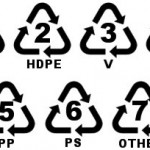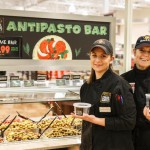- NUMBERS GAME: The fact that a food package displays one of these symbols does not necessarily mean it can be recycled. Courtesy of 1800recycling.com
- EARTH-FRIENDLY: Jackie Norris, left, and Mary Beth Hoban hold plant-based plastic containers Harris Teeter has introduced for its hot bar and olive bar. Photos by Nick King
- SUSHI FAN: Compostable packaging for the sushi sold at Greenlife is provided by Genji, the company that supplies its sushi. Photo by Nick King
- IT’S A WRAP: Greenlife employee Anton Costa packs a cut of meat in wax paper. Photo by Nick King
As we peruse our local grocery store shelves, we can all rest assured that the familiar arrow symbols and numbers displayed on product packages mean the material can be recycled. Right?
“This is a common misconception,” says Barry Lawson, president of Curbside Management in Asheville. “The symbol actually tells you what kind of material the packaging is made from. It does not necessarily identify that it can be recycled.”
Curbside Management, commonly known as Curbie, is one of many local options for recycling services and is contracted by the city of Asheville for its blue-cart, curbside pickup. Waste Management of Asheville offers residential and commercial services, Buncombe County offers drop-off at the transfer station, and there are also several drop-off locations at local stores and businesses. Many townships now participate in the county’s “blue bag” recycling program.
Recyclables from No. 1 (PET, or polyethylene terephthalate, commonly used for soda bottles) to No. 7 (which includes the plant-based, compostable polylactides, as well as hard, polycarbonate plastics) are collected and gathered in the Asheville area. Curbie collects in the city and other locations, transporting the materials to processors for making new products, Lawson explains. “We’re able to consistently move Nos. 1, 2 and 5 almost anywhere. Three, 4, 6 and 7 are more difficult because outlets are limited.” And recently it has become even harder, which Lawson suspects could be connected with the ability to export these plastics, “We mix those numbers together and ship them. Then they are exported to countries with lower labor costs.”
At salad stations, hot bars, bulk bins, olive and other bars, most local grocers offer packaging choices that range from compostable plates to recyclable and reusable containers. Grocers and retailers often provide collection bins where customers can recycle plastic bags and paper, but these same stores routinely use one of the most difficult packaging materials to recycle: the foam trays used to hold meat and fish.
The Styrofoam dilemma
Commonly referred to by the trade name Styrofoam, expanded polystyrene foam is relatively cheap and lightweight, and performs well under the supermarket wrapping process. It falls under the recyclable symbol No. 6, yet according to the Earth Resource Foundation, it is made from nonrenewable petroleum, the production process tends to be toxic, it is not biodegradable, and there are no widespread recycling options. Many cities have banned this type of packaging, including Seattle, Portland, Ore. and San Francisco. Earlier this year, New York Mayor Mike Bloomberg attempted to ban polystyrene foam cups and containers from restaurants in the city.
Catherine Becker, communications manager for Harris Teeter, says the North Carolina-based supermarket chain has researched substitute packaging for foam meat trays and continues to explore possibilities. “Shelf life on certain packaging based on composition may be minimal; a more rigid tray requires a higher-gauge plastic to wrap the product; and a bamboo tray would start to disintegrate if or when it came in contact with a liquid,” Becker says. “Some alternatives we’ve looked at are cost-prohibitive and some did not prove to be a viable alternative.”
But the company has made progress replacing polystyrene foam in some areas. “Harris Teeter has introduced plant-based, nonpetroleum plastic containers for our in-store, fresh-cut fruit,” Becker says. “We also use polypropylene hot-food containers and olive-bar containers, to name a few.”
Whole Foods Market began seeking alternatives for polystyrene foam years ago, experimenting with bulrush fiber. Unfortunately, the plant fiber was twice as costly and much heavier and less visually appealing to customers than the polystyrene equivalent. The fiber trays also begin to degrade if exposed to too much moisture. “Customers are definitely concerned with freshness when it comes to meat,” says Sarah Rae German, associate store team leader at Whole Foods’ Asheville store, Greenlife.
The result of the company’s commitment to find alternatives is evident: Greenlife offers prepackaged meat in No. 5 plastic trays and shrink-wrapped in plastic. The majority of the grocery’s fresh meat is selected and wrapped at the butcher counter. “The wax paper used to wrap meats from the butcher counter is compostable and freezable, and our sushi trays are compostable,” German says.
Dave Campbell, food service director of the newly opened Katuah Market, says, “Packaging is a huge source of waste in the food industry.” Katuah is committed to recyclable alternatives, he says. “We are using a variety of packaging, including compostable containers on our food bars, BPA-free, consumer reusable, recyclable containers for our deli case and grab-and-go section. For wrapping up our sandwiches and meats, we use recycled, unbleached butcher paper.” Some of the packaging that appears to be plastic is actually potato-based or corn-based — it’s compostable.
Ingles Markets CFO Ron Freeman says, “Many of our meat and fish products are prepared for sale right in our stores. Purchases from our cases are wrapped in butcher paper. We also use butcher paper if a customer requests it. We are always open to alternatives that offer a good mix of food safety, recyclability and cost.”
A big problem with recycling the polystyrene foam trays from meat and fish is cleanliness, Lawson says. Contaminated materials often cannot be recycled. This is a problem with plastic bags as well. “Many plastic bags taken to the recycler end up in a landfill,” he says. “Maybe someone puts a soda bottle in there with a tiny bit of liquid in it. It spills, and you end up with a contaminated product, and the end user doesn’t want it.”
Another issue is economics. Most commodities sell by the pound or ton, and polystyrene tends to be very light. The transport costs are high — a combination of the low fuel efficiency of trucks and the high price of diesel fuel. To top it off, there are few end users, which makes recycling polystyrene unfeasible. “Most Styrofoam recyclers are looking for the big block packaging that protects new televisions and computers,” Lawson explains. “That’s what mostly gets recycled.”
Suppliers are part of the problem grocers must contend with. Becker says, “Harris Teeter does package some meat products in-store, but others arrive packaged.”
German concurs. “Suppliers could be more mindful of the amount of packaging and what could be recycled.”
And Freeman says, “We also have customers that prefer Styrofoam due to ease of transportation, storage and leak prevention. That also applies to some of our outside vendors such as our poultry suppliers.”
Supply-side solutions
But can suppliers be expected to worry about the end life of their products? One local producer made it a top priority to find ways that end products could be recycled. Derric Brown, sustainability director at Evergreen Packaging in Canton, says, “We think it’s the right thing to do.” Evergreen makes aseptic and gable-top containers — the waxy paper product used to package many organic milks, boxed soups and juices. The company creates this product from wood harvested from responsibly managed forests.
In 2009, Evergreen Packaging aligned with three other leading carton manufacturers to form the Carton Council. Securing viable outlets for fiber recovered from recycled cartons is among the council’s key initiatives, and it serves as a matchmaker in the marketplace. Cartons are now being recycled into tissues, envelopes and other paper products. In 2011, Curbside Management became one of many companies Evergreen recruited to transport the recycled material to the end user, typically a paper mill. Now Evergreen’s product doesn’t have a recyclable symbol on it, because it has somewhere to go.
Brown says, “The recycle logo doesn’t matter. It’s whether or not the community accepts it that determines if it is recyclable.” Perhaps as public awareness increases, suppliers of polystyrene foam will follow Evergreen’s example and embrace what Brown refers to as “voluntary producer responsibility,” which means taking a more proactive approach to finding end users and methods to ensure the products they manufacture are recycled.
Curbside Management does not currently accept Styrofoam. “The best thing to do is not to use it,” Lawson says, “and to ask companies not to use it.”
Some stores have started to take this advice. “There will be no polystyrene used to package anything on our shelves at Katuah Market,” says Campbell. “We tell our vendors we won’t accept that type of packaging.”
To find out whether cartons are recyclable in your community go to recyclecartons.com.








Before you comment
The comments section is here to provide a platform for civil dialogue on the issues we face together as a local community. Xpress is committed to offering this platform for all voices, but when the tone of the discussion gets nasty or strays off topic, we believe many people choose not to participate. Xpress editors are determined to moderate comments to ensure a constructive interchange is maintained. All comments judged not to be in keeping with the spirit of civil discourse will be removed and repeat violators will be banned. See here for our terms of service. Thank you for being part of this effort to promote respectful discussion.